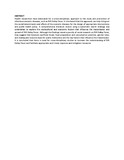| dc.contributor.author | Muga, GO | |
| dc.contributor.author | Onyango-Ouma, W | |
| dc.contributor.author | Sang, R | |
| dc.contributor.author | Affognon, H | |
| dc.date.accessioned | 2015-02-19T11:27:09Z | |
| dc.date.available | 2015-02-19T11:27:09Z | |
| dc.date.issued | 2015 | |
| dc.identifier.citation | Am J Trop Med Hyg. 2015 Feb 16. pii: 14-0363. [Epub ahead of print] | en_US |
| dc.identifier.uri | http://www.ncbi.nlm.nih.gov/pubmed/25688166 | |
| dc.identifier.uri | http://hdl.handle.net/11295/80561 | |
| dc.description.abstract | Health researchers have advocated for a cross-disciplinary approach to the study and prevention of infectious zoonotic diseases, such as Rift Valley Fever. It is believed that this approach can help bring out the social determinants and effects of the zoonotic diseases for the design of appropriate interventions and public health policy. A comprehensive literature review using a systematic search strategy was undertaken to explore the sociocultural and economic factors that influence the transmission and spread of Rift Valley Fever. Although the findings reveal a paucity of social research on Rift Valley Fever, they suggest that livestock sacrificial rituals, food preparation and consumption practices, gender roles, and inadequate resource base for public institutions are the key factors that influence the transmission. It is concluded that there is need for cross-disciplinary studies to increase the understanding of Rift Valley Fever and facilitate appropriate and timely response and mitigation measures | en_US |
| dc.publisher | University of Nairobi | en_US |
| dc.title | Sociocultural and economic dimensions of Rift Valley fever. | en_US |
| dc.type | Article | en_US |
| dc.type.material | en | en_US |

